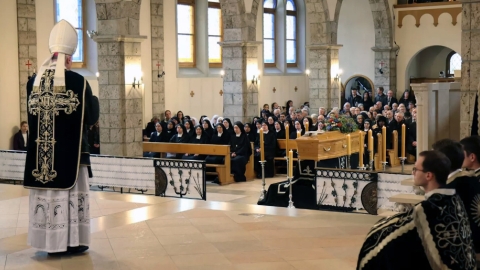The Didache: The Two Ways

St. Sisoes the Great contemplates death at the tomb of Alexander the Great
The Didache, sometimes called “The Lord's Teaching Through the Twelve Apostles to the Nations” in reference to its opening line, is a first-century document governing Church order and one of the oldest catechetical texts in Christendom. This second installment of a five-part series on the Didache explores its connection to “the two ways” tradition in Judaism and Christianity and the document’s role as a catechetical text.
The Way of Life
As noted in the first part, scholars have placed the Didache in the context of the “two ways tradition,” which posits that there are two ways or paths in life: one which leads to darkness, and another toward light. It is a tradition that should be recognizable to all who pray Sunday Matins or who have opened the Book of Psalms (1:1): “Blessed is the man who hath not walked in the counsel of the ungodly, nor stood in the way of sinners, nor sat in the chair of pestilence.” The man who has walked this path—this way—is contrasted with “the wicked” who are “like the dust, which the wind driveth from the face of the earth” (1:4). “For the Lord knoweth the way of the just: and the way of the wicked shall perish” (1:6).
The Didache, in its opening line, counsels: “There are two ways, one of life and one of death; but a great difference between the two ways” (1:1).
For early Christians who came from a Jewish background, the text would have evoked not just the first Psalm, but contrasts such as the man who walks by dark rather than light ways (Prov. 2:11-15) or, more explicitly, “But the path of the just, as a shining light, goeth forwards and increaseth even to perfect day. The way of the wicked is darksome: they know not where they fall” (Prov. 4:18-19). Consider also this declaration from Jeremias: “Thus saith the Lord: Behold I set before you the way of life, and the way of death” (21:8). For those from a pagan background, passages from Hesiod’s Works and Days and Xenophon’s Memorabilia may have come to mind.
The Didache continues in familiar fashion: “The way of life, then, is this: First, you shall love God who made you; second, your neighbor as yourself; and all things whatsoever you would should not occur to you, do not also do to another” (1:2).
While this passage echoes the teaching found in Mt. 22:37-39, Mk. 12:29-31, and Lk. 10:27, its relative brevity compared to the Gospel texts suggests that it may have come to the Didache’s author through an oral or other written tradition. Indeed, throughout the document there exists numerous quotations, synopses, and references that are similar to, but not precisely reflective of, various New Testament texts, which reinforces the view that the document is a product of the early Church before the full canon of Scripture was codified and disseminated. Even without access to the entirety of what later Christians came to know as the New Testament, the Didache’s author, as a member of the Church, was familiar with the core tenets of the Faith, including the central teachings of Jesus.
The remaining of the Didache’s opening chapter sets forth additional commandments for “the way of life,” including—but not limited to—praying for one’s enemies; fasting for those who persecute you; loving those who hate you; abstaining from lust; and avoiding reprisals. With respect to material goods, the text teaches (1:4-5):
If someone takes away your cloak, give him also your coat. If someone takes from you what is yours, ask it not back, for indeed you are not able. Give to every one that asks you, and ask it not back; for the Father wills that to all should be given of our own blessings (free gifts). Happy is he that gives according to the commandment; for he is guiltless.
Again, the parallel to the Gospels should be obvious. What is less explicit in the Gospels, but no less important to early Christians, is the following elaboration (1:5-6):
Woe to him that receives; for if one having need receives, he is guiltless; but he that receives not having need, shall pay the penalty, why he received and for what, and, coming into straits (confinement), he shall be examined concerning the things which he has done, and he shall not escape thence until he pay back the last farthing. But also now concerning this, it has been said, Let your alms sweat in your hands, until you know to whom you should give.
In other words, there is no shame or sin when the poor receive goods, but the text warns those who would take when they are without need. At the same time, the text counsels prudence when distributing to those who ask, for not all may be in need. The expression, “Let your alms sweat in your hands…”, though not found expressly in Scripture, was commonplace enough in the early Church that it made its way into numerous writings throughout the centuries such as the works of Ss. Augustine, Gregory the Great, and Bernard of Clairvaux. Where Augustine may have first come across the expression is difficult to say, though his invocation of the maxim implies he took it no less seriously than if it had come from the Bible.
Avoiding Sin
Chapters 2 and 3 of the Didache can be summarized by a line from the text itself, “My child, flee from every evil thing, and from every likeness of it” (3:1). Anger, jealousy, lust, idolatry, lying, and blasphemy are among those passions and acts, no less common at the dawn of the Church than in the modern world, which a Christian seeking the way of life must avoid at all costs (3:2-6). The Didache also warns how these dispositions can lead to further sin. For example, “anger leads to murder”; “lust leads to fornication”; and being a liar “leads the way to theft.”
Reflecting at points the Decalogue (Ten Commandments), the Didache provides a catalog of prohibitions, including murder, adultery, fornication, and swearing falsely (2:2-7). Of particular importance for our own day and ongoing political disputations is the text’s unequivocal command: “[Y]ou shall not murder a child by abortion nor kill that which is begotten.”
Although it is fashionable for some liberal Catholic and non-Catholic Christians to suggest that the Bible, or at least the New Testament, is “silent” on the question of abortion, the Didache is not. It is proof that from the Church’s beginning, abortion was regarded as a grave sin, as was the pagan practice of exposure, that is, leaving a child to die following birth.
This arc of the Didache is concluded in Chapter 4, which contains a summary of other precepts essential to the Christian life. For instance, the chapter opens by directing Christians to remember and respect Church leaders and “honor him as the Lord…for in the place whence lordly rule is uttered, there is the Lord” (4:1-2). The text continues to encourage Christians to give freely of their goods; for parents to instruct their children in the Faith; and to not cause division within the Church or with one’s neighbor.
The Way of Death
Given its relative compactness compared to the earlier chapters, it is worth quoting Chapter 5 of the Didache in full:
And the way of death is this: First of all it is evil and full of curse: murders, adulteries, lusts, fornications, thefts, idolatries, magic arts, witchcrafts, rapines, false witnessing, hypocrisies, double-heartedness, deceit, haughtiness, depravity, self-will, greediness, filthy talking, jealousy, over-confidence, loftiness, boastfulness; persecutors of the good, hating truth, loving a lie, not knowing a reward for righteousness, not cleaving to good nor to righteous judgment, watching not for that which is good, but for that which is evil; from whom meekness and endurance are far, loving vanities, pursuing requital, not pitying a poor man, not laboring for the afflicted, not knowing Him that made them, murderers of children, destroyers of the handiwork of God, turning away from him that is in want, afflicting him that is distressed, advocates of the rich, lawless judges of the poor, utter sinners. Be delivered, children, from all these.
This list of vices and those who indulge in them are a warning for those who would walk the Christian way. In keeping with the Didache’s earlier guidance, Christians should flee from such persons and their ways lest they sacrifice their inheritance, which is eternal life.
Comparable lists of vices and sinners are found as well in other early Church writings mentioned in the first part of this series: the Doctrina Apostolorum and the Epistle of Barnabas. All of them reference in part the fifth, sixth, and seventh Commandments before expanding on other no less serious affronts to God. In concluding this section, the author of the Didache offers a brief petition that those who being instructed in the Faith “[b]e delivered…from all these”: sin and sinners alike.





